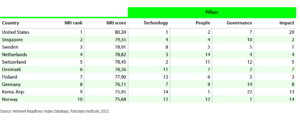November 15, 2022
The latest results and rankings of the 2022 Network Readiness Index (NRI) were released today, revealing the most digitally-ready economies worldwide.
This year’s theme, ‘Stepping into the new digital era: How and why digital natives will shape the world’, explores the challenges and opportunities that the digital era presents for younger generations (or ‘digital natives’), and some of the key dimensions along which they will build the next stages of our collective future. The results also delve into the state of post-COVID era of accelerated digital transformation.
Global launch event
The virtual launch featured a presentation of key findings of the NRI 2022 by Soumitra Dutta (President, Portulans Institute; Dean, Saïd Business School) and a high-level panel discussion with select speakers moderated by Bruno Lanvin (Director, Portulans Institute), among whom were Emily Herrera (Investor, Night Ventures), Bill Dutton (Senior Fellow, Oxford Internet Institute, University of Oxford), Alexandre Le Voci Sayad (Co-Chair of the International Steering Committee, UNESCO Media and Information Literacy Alliance), and Cecilia Zhao (Venture and Growth Investor, Kinnevik). Panelists shared their insights and personal experiences across several dimensions of digital transformation, including intergenerational effects, the future of work, developments in higher education, and digital entrepreneurship.
“Nearly 70% of Gen Z want to be a central point of influence on social networks. This requires new skills that aren’t taught in our education institutions.” – Em Herrera, Investor, Night Ventures
“Because of how fast our digital society is evolving, media literacy education has become a lifelong learning process.” – Alexandre Le Voci Sayad, Co-Chair of the International Steering Committee, UNESCO Media and Information Literacy Alliance
“We are seeing greater representation of people from diverse backgrounds in the investment space, but there’s certainly a lot more we can do. We must embed diversity and inclusion as important metrics in our work.” – Cecilia Zhao, Venture and Growth Investor, Kinnevik
“In today’s digital era, it’s not just technical knowledge that is required, but also social competences and the application of ethics.” – Bill Dutton, Senior Fellow, Oxford Internet Institute, University of Oxford

Mr. Bernardo Ivo Cruz, (Secretary of State for International Trade and Foreign Investment, Portugal), Dr. Tawfik Jelassi (Assistant Director-General for Communication and Information, UNESCO), Mr. Yousef Al Naama (CEO, malomatia) and Mr. Paulo Alvim (Minister of Science, Technology and Innovation, Brazil) shared messages with our audience discussing the role of youth in digital transformation, best practices for policymakers in today’s digital era, and the importance of benchmarking network readiness. Their full messages can be found on the Portulans Institute YouTube channel.

Key results

“Our collective digital future is being shaped by the combination of technology and people. We must combine these with the appropriate governance structure to create the right impact.” – Soumitra Dutta, President, Portulans Institute; Dean, Saïd Business School, University of Oxford
The United States, Singapore, and Sweden emerge as this year’s most network-ready economies.
The United States remains the global leader in adoption and investment of Technology, Korea continues to lead as a society of digitally-skilled People. Norway dominates in Governance and regulation of digital technologies, while Sweden demonstrates leadership with regards to the overall Impact of technology on the economy and society.
China – which enters the top 25 for the first time since 2019 – and India are among the biggest movers, rising to 23rd and 61st, respectively, and showing a high concentration of AI talent and strong investment in technology.
Ukraine (50th) leads its middle to low-income peers due to especially high adoption and investment in technology and overall strong efforts of improving the connectivity of its citizens.
Rwanda (101st) leads the low-income country category thanks to marked improvements in the overall regulatory framework for digital technologies.
Lower-middle and low-income economies appear to be bouncing back to performance levels of network readiness seen prior to the pandemic faster than high and upper-middle income group economies, as evidenced by digital transformation champions such as India, Kenya, Philippines, Côte d’Ivoire, Ethiopia, and Madagascar.
Find more highlights and explore our interactive rankings map at https://networkreadinessindex.org/.
About the Network Readiness Index (NRI)
Initially launched in 2002 with the World Economic Forum, and published under the auspices of the Portulans Institute, the Network Readiness Index (NRI) is an annual report that assesses countries’ digital readiness. This year’s edition, published in partnership with Saïd Business School, University of Oxford, ranks a total of 131 economies based on their performance across 58 indicators. The NRI model is focused on capturing how technology and people need to be integrated within an effective governance structure in order to have the right impact on our economy, society and the environment.
Acknowledgments
Portulans Institute extends a special thank-you to all who attended the event, as well as our esteemed panelists and speakers. We would like to express our gratitude towards Saïd Business School at the University of Oxford for co-publishing the report. We would like to thank malomatia, the sponsor and knowledge partner for the NRI 2022. We are grateful for the continuous support and active participation of our partners, the Advisory Board, and the NRI Technical Advisory Group. We give additional thanks to the Joint Research Centre (JRC) for ensuring the accuracy of our metrics and findings.
For more information, visit the official NRI website at https://networkreadinessindex.org/
Join the conversation on Facebook, Twitter, LinkedIn, and Instagram using the hashtag #NRI2022.
For press inquiries, contact info@portulansinstitute.org or media.office@sbs.ox.ac.uk



